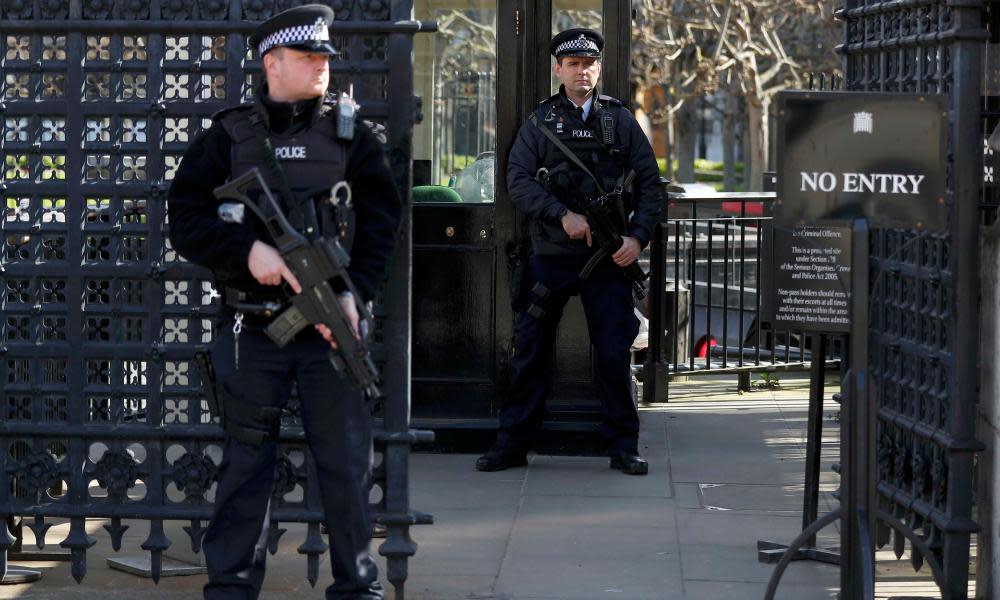London terror attack throws plan for renovating parliament into confusion

The Westminster terror attack has strengthened the case for MPs and peers to remain in parliament under one roof during a £4bn restoration, rather than undergo evacuation to different buildings, a former independent reviewer of terrorism legislation has said.
Lord Carlile, who sits as a non-aligned peer in the House of Lords, told the Observer that the security implications and costs of “decanting” all MPs, peers and palace staff to other buildings around Whitehall should make the authorities think again about the wisdom of such a move. The peer said he believed the attack would inevitably have implications for the refurbishment plan, which was due to be debated and voted upon in the House of Commons before Easter.
The debate has been postponed amid suggestions that a major rethink will take place in the light of last Wednesday’s events.
“I personally favour staying where we are if we can,” he said. “Anything that makes the case that we should stay in one building will be seized upon. The security issues and costs of moving us out to different locations would be very considerable. I am sure that people will be pressing to remain within the parliamentary estate.”
The Palace of Westminster has not undergone a major refurbishment since the 1950s and is in desperate need of structural repair, as well attention to electrical cables and asbestos that lie behind much of its wooden panelling, including that behind the Commons chamber itself. But while several reports have stressed the urgency of repairs, and argued that these could be done faster and more cheaply if everyone moved out, some MPs and peers are resisting the move and want further studies to be done on the feasibility of using only parts of the building while work is carried out.
Carlile also believes that the authorities may conclude that the Palace of Westminster should be protected from passing traffic, as happens outside Buckingham Palace and the National Gallery in Trafalgar Square. “It may well be that we need to do the same thing around the Palace of Westminster which is to push traffic well away from the building.”
The Liberal Democrat leader, Tim Farron, said that he believed the refurbishment plans, which according to some estimates could take between eight and 10 years to complete, should be re-examined so that security lessons from the attack are learned and any extra measures needed are built into the plans. “If we are to spend billions and evacuate the place, we might as well make it more secure, as well as deal with structural issues,” Farron said. “The government has a habit of allowing these contracts to run over budget, but it should be hard-nosed and negotiate proper security into the price that will give strong protection long into the future.
“This is not just about protecting politicians. There are huge numbers of people who work in parliament, and we owe it to them, especially those charged with laying their lives on the line to protect MPs, to make their place of work as secure as we possibly can.”
In his first statement since the terrorist attack, the Foreign Office minister Tobias Ellwood, who tried to save PC Keith Palmer’s life by administering mouth-to-mouth resuscitation, said he was heartbroken that he could not have done more for the policeman who was stabbed to death.
Ellwood, a former regular soldier who is still in the reserves, ran to help the officer as he was lying on the ground in New Palace Yard after being stabbed by Khalid Masood. The Conservative MP for Bournemouth East said he had only played a small part and that he had done what he had been trained to do as a soldier. As a reservist, he undergoes annual training in battlefield first aid.
Ellwood said: “I am heartbroken that I could not do more for PC Keith Palmer who gave his life in holding the line against terrorism and defending democracy.” The MP said he would write to Palmer’s family to offer his condolences. He expressed support for the decision to resume parliamentary business on Thursday.
“It is right that, despite the terrible events on Wednesday, parliamentary business continued the next day as usual and the democratic machine was not interrupted.”
Ellwood said he had been humbled and overwhelmed by the messages of support, especially from the police fraternity, which he had come to recognise was as closely knit as the military. He has now been made a member of the privy council, which means he can be referred to as “right honourable” and can also be given access to top-secret briefings.
“I played only a small part that day, doing what I was taught to do, and am honoured to have been invited to join the privy council afterwards,” he said. “It is right that we concentrate our thoughts on the victims as we stand side by side to protect all that we hold dear, including our precious values and way of life, which will always prevail.”

 Yahoo News
Yahoo News 
